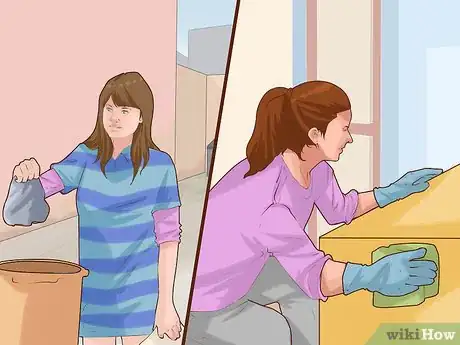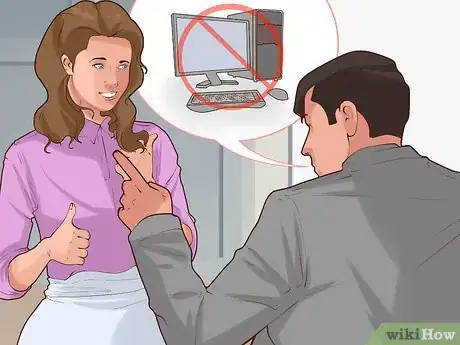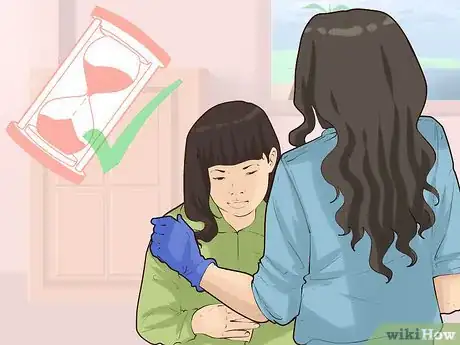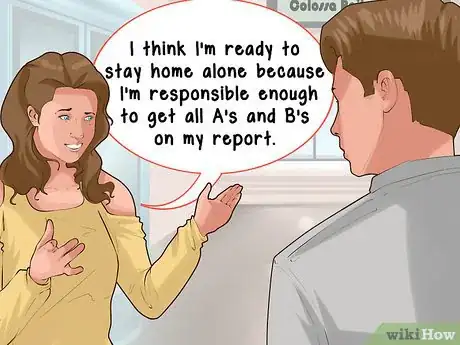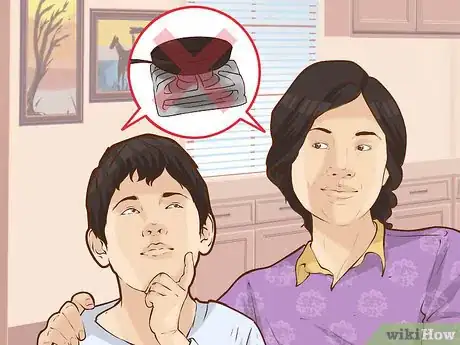This article was co-authored by Trudi Griffin, LPC, MS. Trudi Griffin is a Licensed Professional Counselor in Wisconsin specializing in Addictions and Mental Health. She provides therapy to people who struggle with addictions, mental health, and trauma in community health settings and private practice. She received her MS in Clinical Mental Health Counseling from Marquette University in 2011.
This article has been viewed 65,858 times.
When you reach a certain age, it may start to get annoying that your parents don't feel comfortable leaving you home alone. But whether it's safety or trust issues, parents usually have good reasons for being unsure about leaving you alone. If you feel you're ready to do it, though, it's all about showing your parents how responsible and mature you are. That means being on your best behavior and knowing how to respond to problems and issues that may arise when you're alone.
Steps
Showing You’re Responsible
-
1Do well in school. One of the best ways to show your parents that you’re responsible is to do as well as possible in school. That means studying for tests, getting all of your homework done, and turning in reports and projects on time. If they know that you take your school work seriously without them having to push you, they can start to see that you’re ready for extra responsibilities, such as staying home alone.[1]
- If you’re having trouble with a certain subject in school, show you're responsible by asking for help. See if your teacher can meet with you after school, or ask about how you might get a tutor. You can also ask your parents or siblings for help if it’s a subject that they know something about.
- If you get a poor grade on a test or report, be honest with your parents about it. Try to explain why you didn’t do as well on it as you hoped. If you don’t try to hide a bad grade from them, your parents will know that they can trust you.
-
2Complete your chores. Doing household tasks without having to be reminded is another way to show your parents how responsible you are. They will definitely notice if you make your bed or take out the garbage without them having to nag you. If you have trouble remembering your chores, make a chart of all the things you have to do and when you have to do them, so you can hang it in your room as a reminder.[2]
- If your parents ask you and your siblings to do a certain task, such as help bring the groceries in from the car, you can score points by volunteering.
- You can also make a big impression by doings chores that you haven’t been asked to do. For example, if you notice that the yard is covered with leaves, rake the lawn so your parents don’t have to do it.
- When you're parents are busy with housework or other tasks, you might offer to watch your younger sibling(s) or help them with their homework to remind them how responsible you are.
- If you have family pets, it's a good idea to help care for them too. Take the dog for a walk when he needs to go, refill the cat's water dish when it's empty, or clean the bird's cage when you notice that it's dirty.
Advertisement -
3Obey the rules. Your parents will see you as responsible if they know that you follow the rules that they’ve set. Make sure to follow all of them without complaining too much. For example, If your parents tell you that you’re only allowed a certain amount of time on the internet each day, don’t try to sneak extra time or whine about how your friends can go online whenever they want. Be respectful of the rules, so your parents know that you respect them.[3]
- If there are certain rules that you need to bend on occasion, talk to your parents about them. For example, if you’re supposed to go to bed at a certain time but the movie or sporting event that you wanted to watch won’t be over yet, ask your parents if they can make an exception that one night.
-
4Spend quality time with your parents. Your parents may not want to leave you alone because they want to spend quality time with you. Maybe they’re heading to the movies, and they’d like you to come along. Their feelings might be hurt if you tell them you'd rather stay home by yourself. Making time for your parents could increase the chance they let you stay home in the future.
- When your parents ask you to come with them to an event or activity that you find interesting, say yes! Maybe they'll let you stay behind when they go to a more boring event later on.
Stating Your Case
-
1Ask your parents at the right time. Whenever you’re asking your parents for something, timing is everything. If you ask when they’re in a bad mood or feeling stressed, they’re more likely to say no. That’s why you choose a time when they’re relaxed and happy, so they’re more inclined to say yes.[4]
- Try to identify times when your parents are usually in a good mood, such as after eating their favorite meal or waking up after a good night’s sleep. Those are the ideal times to ask about saying home by yourself.
- Pay attention to times when your parents are usually cranky too. For example, they may be in a bad mood after a long day at work or their favorite team has a lost a game. Avoid asking them about staying home alone at those times.
-
2Stay rational and calm. If you get too emotional when you're talking to your parents, they're probably not going to take you too seriously. That means no yelling, whining, or crying when you ask about staying home alone. You also should avoid complaining that all of your friends are allowed to do it. Your parents usually aren't going to see that as a very good reason to give permission.[5]
- If you feel yourself getting frustrated and losing your cool while you're talking to your parents, try counting to 10 in your head. That can help give you time to get yourself under control so you don't do something that you regret.
-
3Explain why you think you’re ready. To convince your parents that you’re responsible enough to stay home alone, it’s important to explain why you think you’re ready. Point all the ways that you’ve shown how responsible you are, such as good grades on your report card and how they haven’t had to remind you to wash the dishes after dinner. You should also reassure them that you know what to do in case of an emergency, so make sure you know how to find all the contact numbers you may need.[6]
- When you’re explaining to your parents, keep things simple. You might say, “I think I’m ready to stay home alone because I’m responsible enough to get all A’s and B’s on my report and remember to walk the dog every afternoon. I also know to call 911 if there’s an emergency or Mrs. Smith next door if I have non-emergency problem. You can trust me.”
- Your parents may be concerned that you’ll be afraid to be home alone. Reassure them that you aren’t scared. For example, you might say, “I’m totally comfortable being home alone,” or “It doesn’t worry me to be home by myself at all.”
- Make sure that you know how to work your home’s security system and that you know where certain safety equipment, such a fire extinguisher, is located.
-
4Point out the potential for personal growth. Your parents may be more likely to allow you to stay home alone if you explain how it will help you become more mature and responsible. Explain that it will enable you to become more independent so you're better able to take care of yourself and help out around the house.[7]
- You might say something like, "It will help me become more mature because I'll understand how important it is to be cautious around the house with things like locking the door and other safety measures."
-
5Be grateful. When you’re asking your parents for permission to stay home alone, it’s a good idea to show gratitude to them. That way, they won’t think that you just expect to get your way whenever you ask for something. Acknowledge all the times that your parents have show trust in you or allowed you to do something that you asked for, so they know you appreciate their faith in you.[8]
- Be as specific as possible when you’re showing your gratitude. For example, you might say, “I really appreciate that you let me stay up late to watch the playoff game last week,” or “It really meant a lot that you trusted me enough to go to Carly’s house on a school night.”
-
6Use subtle persuasion. In some cases, you may need to explain how allowing you to stay home alone will benefit your parents directly. For example, you might point out that they won't have to spend as much money on babysitters if you can stay by yourself. You can suggest that they can have more date nights or evenings out with friends too.[9]
- Don't lay it on too thick when you're trying to use this type of persuasion. If you make it seem like you're the one doing them a favor, they're probably going to be skeptical.
-
7Suggest a test run. If you sense that your parents are on the fence about letting you stay home alone, it might be a good idea to do a practice run before they fully commit one way or another. See if they’re willing to let you stay home alone for a brief period of time instead of an entire day or night to see how you do when you’re on your own to help reassure them.[10]
- Keep the test run short. You might suggest that the next time your parents need to run to the grocery store for milk, they let you stay home. Even if you’re only alone for 15 or 20 minutes, it may help convince your parents that you can handle the responsibility.
- In some cases, your parents may need multiple test runs before they’re comfortable leaving you home alone for an entire evening. You should be willing to do it as many times as it takes to convince them that you’re responsible enough to stay alone for longer periods.
-
8Give them time to think. If you put your parents on the spot and demand an answer as soon as you ask, they’re much more likely to say no. Instead, tell them that you want them to think about the situation for a while before making a decision. While they’re thinking, be patient and don’t keep bugging them about it.[11]
- To help you stay patient, it’s a good idea to set a specific time that you’ll discuss the topic again. For example, you might say, “Why don’t you think about it for a while? We can talk again on Friday afternoon.”
Getting Your Answer
-
1Be willing to compromise. When your parents are deciding whether to let you stay home alone, you have to be willing to meet them in the middle. They might only be comfortable leaving you home alone in certain situations, and you should respect their feelings and agree. Even if you’re only allowed to stay home alone once in awhile, it’s an opportunity to prove that you can be trusted on your own all the time.[12]
- Your parents may be some conditions on when you can stay home alone, such as only when they’re going to be gone for a couple of hours or less, or when neighbors that they trust are going to be home next door while they’re gone. The conditions may seem annoying, but it still gives you a chance to build trust.
- Your parents may also want to establish ground rules for when you’re home alone. For example, they may not want you to have friends over or use the stove when they’re gone. Make sure that you go over all of the rules so you understand what’s expected of you.
-
2Accept the decision calmly. If your parents decide that you’re not ready to stay home alone, you should react to their decision maturely. Yelling or whining will only convince them that they were right in saying no. Instead, accept the decision in a calm, controlled manner so they can see how mature you are.[13]
- Remember, this is a big decision from a parent’s perspective, and it may not be in your power to influence it. You can get the best grades in the world and obey all their rules, and they still might be hesitant because of general safety concerns.
- It’s okay to let your parents know that you’re upset with the decision, but be respectful. For example, you might say, “I’m very disappointed, but I understand your decision.”
- You may also want to ask if you can revisit the subject again in the future. That way, your parents will know that you’re very serious about the idea of staying home alone and you’ll have hope for the future.
-
3Wait before asking again. If your parents won’t let you stay home alone after your discussion, you’ll probably want to ask about it again as soon as possible. But it’s a bad idea to push the issue so soon after they’ve said no. Instead, give them some time to think about the idea further. Try to wait at least a month or two before asking again, so your parents have even more time to see how mature and responsible you are.[14]
- When you’re waiting to ask your parents about staying home alone again, be on your best behavior. Maintain good grades in school, do all of your chores, and follow all of your parents’ rules. The more they see you behaving in a responsible way, the more likely they’ll be to say yes the next time.
Expert Q&A
-
QuestionI excel at all of these things, but my parents still treat me like a baby. It makes me really angry, and I feel like I'm going to snap. What should I do to convince them to let me stay home alone?
 Trudi Griffin, LPC, MSTrudi Griffin is a Licensed Professional Counselor in Wisconsin specializing in Addictions and Mental Health. She provides therapy to people who struggle with addictions, mental health, and trauma in community health settings and private practice. She received her MS in Clinical Mental Health Counseling from Marquette University in 2011.
Trudi Griffin, LPC, MSTrudi Griffin is a Licensed Professional Counselor in Wisconsin specializing in Addictions and Mental Health. She provides therapy to people who struggle with addictions, mental health, and trauma in community health settings and private practice. She received her MS in Clinical Mental Health Counseling from Marquette University in 2011.
Professional Counselor Remember that staying home alone is a privilege, not a right. If you make a big deal out of it, they may become suspicious about your motives. For example, they might think that you want to do things at home that you don't want them to see. In the meantime, all you can do is be respectful and mature. Even if their wishes seem ridiculous to you, follow them. Losing your temper will only make the situation worse.
Remember that staying home alone is a privilege, not a right. If you make a big deal out of it, they may become suspicious about your motives. For example, they might think that you want to do things at home that you don't want them to see. In the meantime, all you can do is be respectful and mature. Even if their wishes seem ridiculous to you, follow them. Losing your temper will only make the situation worse.
Warnings
- When you’re home alone, don’t open the door for strangers. You should also ask your parents what to tell anyone who calls on the phone asking for them -- they may not want you to let a stranger know that they’re not at home.⧼thumbs_response⧽
References
- ↑ http://kidshealth.org/en/parents/home-alone.html#
- ↑ http://kidshealth.org/en/parents/home-alone.html#
- ↑ http://kidshealth.org/en/parents/home-alone.html#
- ↑ http://www.huffingtonpost.com/hanaan-rosenthal/advice-for-teens_b_2037523.html
- ↑ http://aspeneducation.crchealth.com/article-building-trust/
- ↑ http://aspeneducation.crchealth.com/article-building-trust/
- ↑ http://kidshealth.org/en/parents/home-alone.html
- ↑ http://www.huffingtonpost.com/hanaan-rosenthal/advice-for-teens_b_2037523.html
- ↑ http://www.huffingtonpost.com/hanaan-rosenthal/advice-for-teens_b_2037523.html
- ↑ http://kidshealth.org/en/parents/home-alone.html#
- ↑ http://www.huffingtonpost.com/hanaan-rosenthal/advice-for-teens_b_2037523.html
- ↑ http://aspeneducation.crchealth.com/article-building-trust/
- ↑ http://aspeneducation.crchealth.com/article-building-trust/
- ↑ http://kidshealth.org/en/parents/home-alone.html#

